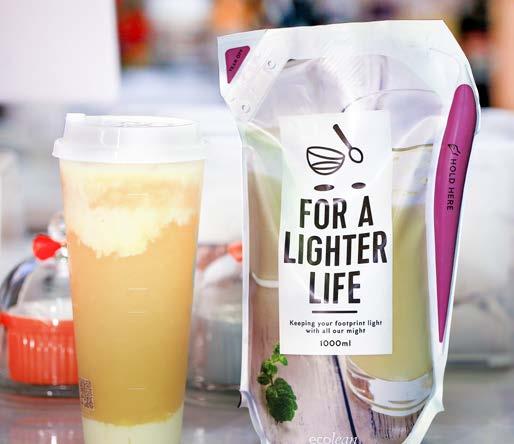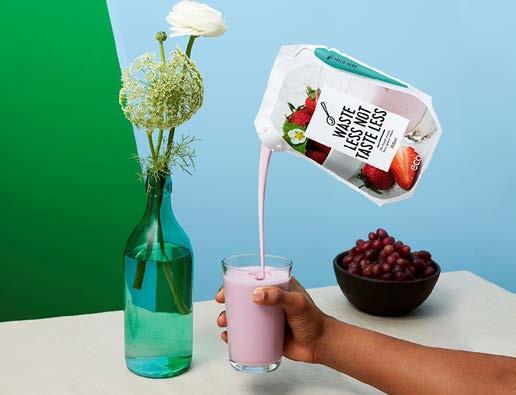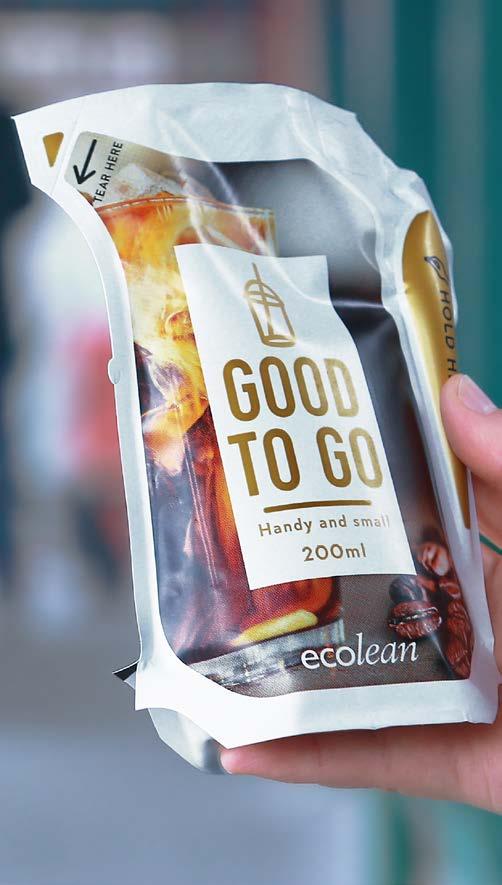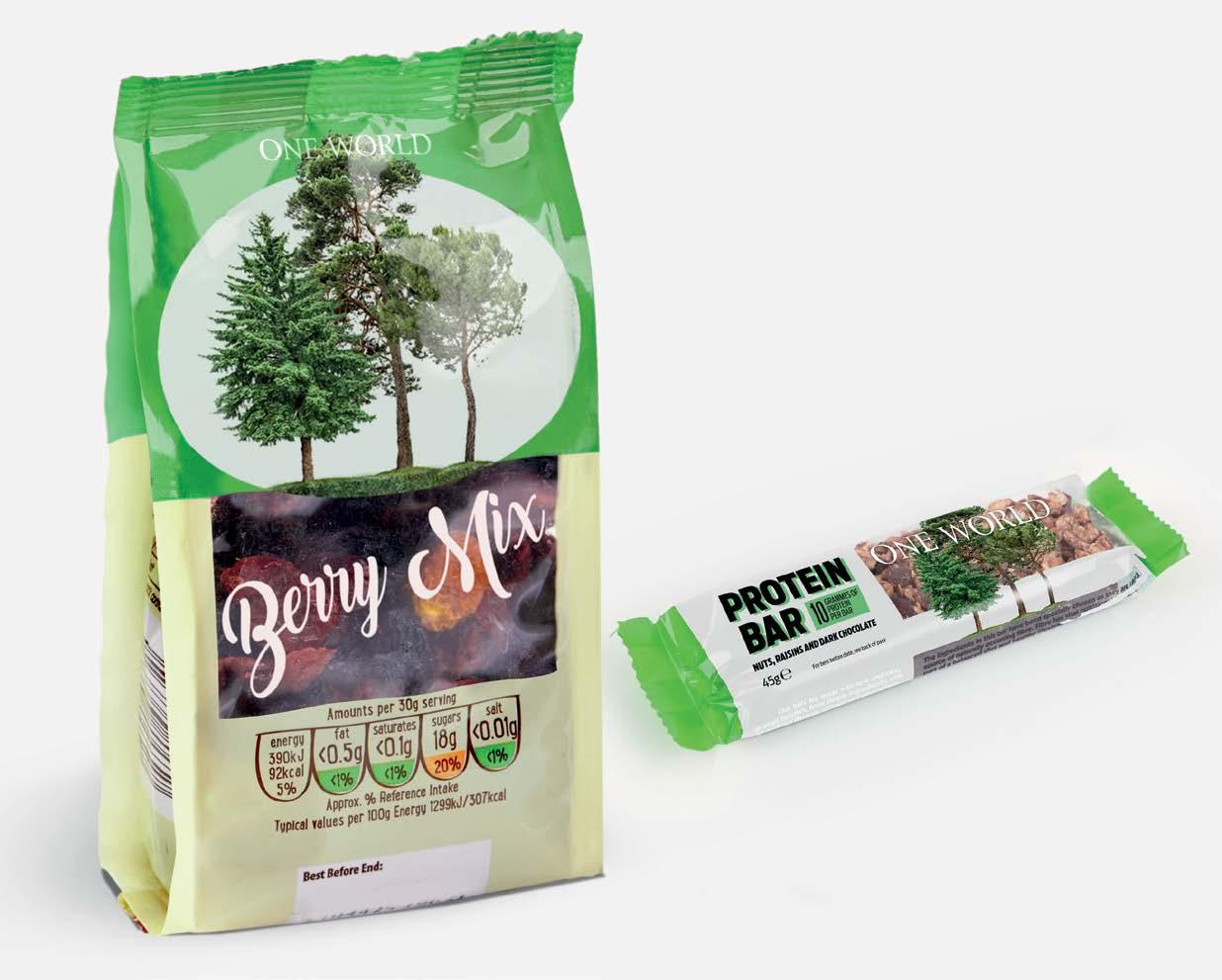
8 minute read
Ecolean
from SPN April 2021
by spnews.com
Ecolean Liquid assets
The global liquid food industry’s main asset can be found today in the form of Ecolean’s advanced and, lightweight packaging solutions holding clear sustainability credentials. Their unique, and smart products satisfy the demands of today’s modern consumers and help dairy, beverage and liquid food producers increase their consumer appeal and visibility worldwide.
Advertisement
Global lightweight packaging producer Ecolean, realise that they have an important role to play in driving the development of sustainability in the packaging industry, forward. Lightweight packages allow the brand owners it works with to reduce both costs and environmental impact whilst maintaining the structural integrity and safety of their products.
A lighter approach
Ecolean’s approach to packaging is ‘lightweight’, which is to the benefit of both consumers and the environment. Producing lightweight packages using the smallest amount of raw materials as possible, has been in the company’s DNA since it was founded in 1996 in Helsingborg, Sweden. Today Ecolean is a fast-growing and globally expanding business that offers its unique lightweight liquid food packages to some of the world’s best-known brands across more than 30 markets worldwide.
In an exclusive interview with SPN the company explained why it is the supplier of choice for so many and how its strategy for optimising the sustainability and recyclability of its lightweight packaging works. We spoke to Hanna Jeppsson, the Director of Communications of the, Ecolean Group, and asked her a range of topical questions about the company and its sustainability culture, the results of which are published here.
How ‘sustainability-aware’ would you say your company is and what recent measures have you taken to improve your overall contribution to the circular economy? / Are you planning the launch of any new products in the foreseeable future that you can tell us about?
”Sustainability is deeply embedded in Ecolean’s core and business proposition. It is actually the reason why the company was founded in the first place - to produce unique, lightweight packaging solutions and resource-efficient filling lines, all designed to save as much as possible of nature’s limited resources. ”We produce flexible packages for both ambient and chilled distribution with easy-to-use convenience features integrated in the format, for the liquid food, dairy and beverage industry. Since the packages are 50-60% lighter than other types of packages for liquid food, beneficial reductions throughout the packages’ lifecycle are created.
”But this is only one way Ecolean makes a difference every day. We also work very hard to keep our production’s impact to a minimum as well. Just this year we have announced that Ecolean joins the Science Based Targets initiative aligning our climate targets to the Paris agreement. The targets covering greenhouse gas emissions from Ecolean’s operations are consistent with reductions required to keep warming to 1.5°C, the most ambitious goal of the Paris Agreement. We also keep reducing our waste in the production phase, sending zero waste to landfill, and as much as 97% of the production waste is sent to recycling. ”Each year, Ecolean is assessed by trusted sustainability ratings provider EcoVadis and for 2020 we were placed in the top 1% of all 75,000 companies assessed on a global level. We know that our ambitions are high and that our sustainability work is solid and create the change that is needed. But we are equally aware that this is not just one challenge to overcome but continuous, hard and dedicated work to maintain our high levels and constantly improve our efforts.
”Enabling recyclability of our packages on the markets where we are active is one area where we work hard to find solutions. The recycling infrastructure in local recycling systems varies endlessly and by a multilevel approach we try to inspire, educate and facilitate opportunities for recycling of the Ecolean packages. We have also committed to presenting a new packaging range designed for even easier recycling in existing recycling streams, by 2025. This project is under development and focus on adapting the material properties for easier configuration by existing recycling technology”.

In your opinion what have been the most significant developments in terms of recycling of packaging and what is Ecolean doing in this regard?
”We hope to see many new and innovative ways of making packaging’s impact on the environment lighter, in the best ways possible. It is, however, extremely important to take a holistic view on the entire lifecycle of products, for packaging in particular to make sure that the environmental impact actually decreases rather than increases.
Working together with the entire value chain will be key to solve many of the challenges in recycling. Not only do we need collecting, sorting and recycling infrastructures available, we also need to create an aftermarket for the recycled materials. Ecolean addresses all of these areas in different collaborative initiatives and is pleased to see that more and more companies from different parts of the value chain start to join in to find solutions.
A key Ecolean partner is CEFLEX, which is a European consortium of over 140 companies and associations representing the entire value chain of flexible packaging, where Ecolean has been an active member since 2017. CEFLEX recently published design guidelines for flexible packaging by collecting input from the entire value chain.
Today, Ecolean is also part of local recycling initiatives to make recycling possible in more markets, such as Soft Plastic Recycling (New Zealand) and REDcycle (Australia). These are two progressive projects where companies from different segments of the value chain joined forces to create recycling systems for flexible packaging - something that local kerbside collecting systems did not offer. The flexible packages through these initiatives are collected in most leading supermarkets and then sent to local recycling sites. There is no need for shipping the waste to other continents as many other recycling projects entail, with heavy environmental impact as a result. Local recycling initiatives can be argued to be an interim solution with, in comparison, quite low volumes, but they are at least taking action today – recycling tonnes and tonnes of packages – lowering the overall environmental impact and carbon footprint, package by package.
By engaging and sharing knowledge with the recycling industry and working with dedicated recycling projects, Ecolean enhances recycling opportunities for its packaging solutions. Recycling is a priority at Ecolean as it is essential for the sustainable use of packaging and contributes towards a global circular economy.
”One significant development in the industry, which we monitor closely and hope will become commercially viable in the next few years is chemical recycling. Chemical recycling would make it possible for food packages to actually use recycled materials. Today, food safety legislation hinders the use of recycled materials in our packages, actually in most food packaging apart from very precise streams such as PET/rPET. It seems that chemical recycling might be the answer to make the same possible for PP and PE as well”.
What are the key drivers for change in your industry sector and how much is the on-going pressure for greater sustainability and recycling affecting your productivity?
The key driver for change for the liquid food packaging industry, is the consumers. But with that comes a responsibility in realising that these issues are extremely complicated and consumers are forced to take a lot of information into account. We can see many examples where consumers demand another type of packaging to decrease impact in one end of the packages lifecycle, for example sourcing of raw materials, but not having the holistic view of realising that the material have greater impact in the production, transportation and end-of-life phases. This is why we stress taking a life-cycle perspective and a holistic view.
”We believe that it is no longer about if you can or should contribute, but how you can contribute and also in the best possible way from a holistic viewpoint, which would ultimately benefit all of us more in the long run”.
Can you describe your product portfolio and its sustainability credentials?
”Ecolean’s innovative and lightweight packaging solutions are the answer to the demands from the global liquid food industry and modern consumers wanting smart and safe packages. Our unique and distinctive standup pouches make it easier for our customers to be innovative in differentiating their brands, helping dairy, beverage and liquid food producers in markets all over the world to increase customer visibility on the store shelves.
”By using a minimal amount of raw material, Ecolean produces a truly lightweight package to reduce environmental impact. Lightweight packages alone save resources, allowing us all to tread a little bit more lightly and conserve the planet’s limited resources. At the same time, Ecolean’s packaging solutions are easy-to-use and hold unique convenience features – making a big difference in the everyday lives of both producers and consumers”.


The importance of a life-cycle approach
As flexible packaging gains market share, a focus on recyclability is needed both from a supplier perspective as well as from the recycling industry. Flexible packages are lightweight and offer a beneficial reduction of environmental impact, which can be seen throughout the packages’ entire life-cycle.
Recently Ecolean was awarded ‘Platinum Medal Recognition’ by EcoVadis, an independent provider of business sustainability ratings. The company was placed in the top 1% globally of 75,000 assessed companies from over 200 industries.
“We are very pleased that our sustainability work is confirmed to be at the top in a global context,” said Ecolean CEO, Peter L Nilsson. “The demand for lightweight packages with minimal environmental impact for liquid food is increasing, and an independent assessment such as that of EcoVadis helps us to show the world our unrivalled commitment and successful work on developing packaging solutions with sustainability at the core of our business.”
Nilson added, “Furthermore, to help food producers understand the life-cycle impact of our products, Ecolean is the first packaging supplier in the world to review the whole system with detailed analysis and description in Environmental Product Declarations (EPD) – encompassing the lightweight packages as well as filling machines. Being completely transparent with the environmental impact of your product, and presenting the data in a comparable way will increase the possibilities for customers and consumers to grasp the whole picture and make choices based on facts, with less impact on resource use”.




